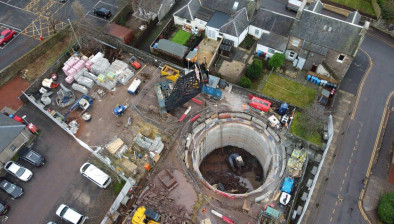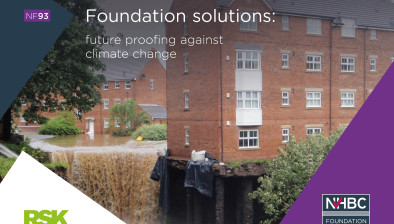Research project to investigate carbon dioxide in disused mines and potential implications for new homes

A research project has been commissioned by the Scottish Government to investigate the prevalence of carbon dioxide in disused mineral mines in Scotland and the potential implications for new residential buildings.
RSKW Ltd, an RSK company based in Stirling, will jointly lead the research project alongside RSK’s geosciences division, which is based in Glasgow.
The research follows a report published by NHS Lothian’s incident management team in December 2017 on reported cases of ill health affecting residents on a recently built local authority housing estate in Gorebridge, Midlothian, a previous mining area. According to the report, 22 residents from a total of 165 in the affected area contacted healthcare services between September 2013 and September 2014 complaining of headaches, dry coughs, dizziness and anxiety.
The investigation concluded that the high-levels of carbon dioxide detected in their properties were of historical coal mine origin. The ground gas was most likely from elevated levels of oxidising coal deposits producing carbon dioxide in the abandoned coal workings. Changes in atmospheric pressure and other factors had caused the carbon dioxide to migrate to the surface.
The incident management team’s report made recommendations relating to Scottish building regulations and new builds. It advised that mine gas mitigation measures should be mandatory in new residential developments in areas the Coal Authority designated as former mining areas. Twenty-six of the 32 Scottish local authorities have former mining areas, including most of the Central Belt, which is the most heavily populated area.
The Scottish Government wants to explore how typical the team’s findings from the Gorebridge incident might be if the Scottish building regulations were not modified. The three-month desk-based research programme will cover all the former mining areas in Scotland. It will also inform any necessary action.
“We are very pleased to be carrying out this important research project for Scottish Government to assess the prevalence of carbon dioxide in disused mineral mines and the implications for residential buildings. We look forward to working with all the relevant stakeholders,” said Andrew Gunning, project manager and partner, RSKW.
Tom Henman, project technical adviser at RSK, added: “This work will build on our previous experience of undertaking environmental research projects and supporting the development of technical guidance on ground gases.”
RSKW and RSK’s knowledge and experience in this field, including that of in-house experts who have authored technical guidance on ground gas assessment, led the Scottish Government to select the company for this project. RSKW and RSK will be engaging with the relevant stakeholders such as local authorities and NHS boards to inform the research investigation and will be holding a stakeholder event in Livingston on 8 November 2018. For details of the event, please contact Andrew Gunning (andrew.gunning@rskw.co.uk) at RSKW.
The company is also looking for examples of earlier incidents involving the impacts of carbon dioxide arising from old mine workings in Scotland. Anyone who wishes to submit a case study can do so by contacting Brian Anderson (brian.anderson@rskw.co.uk) at RSKW or by calling +44 (0)1786 357030.







